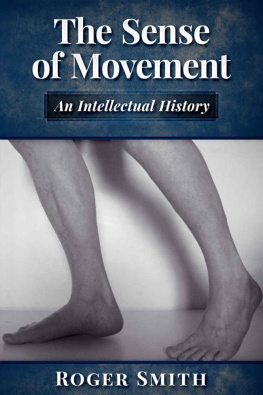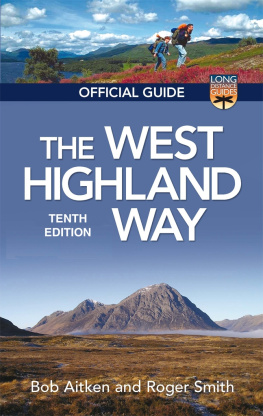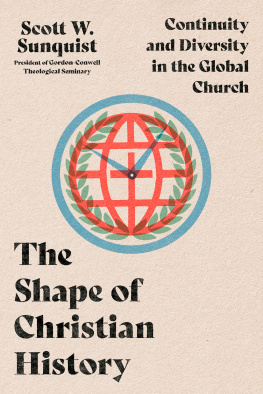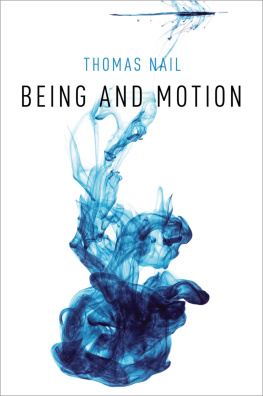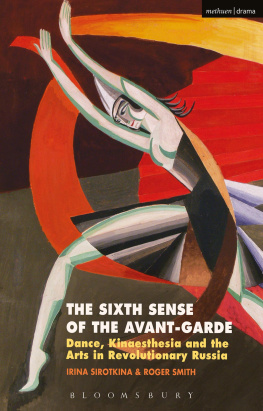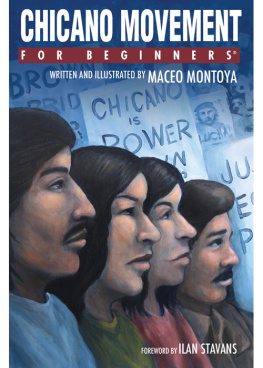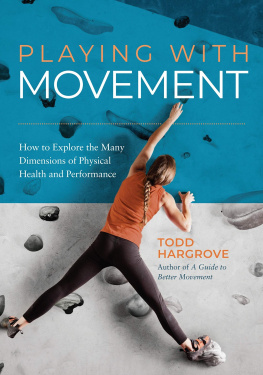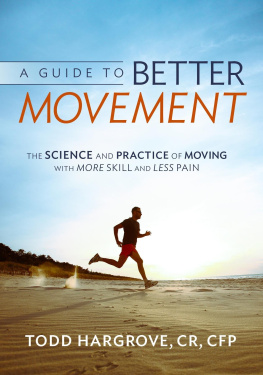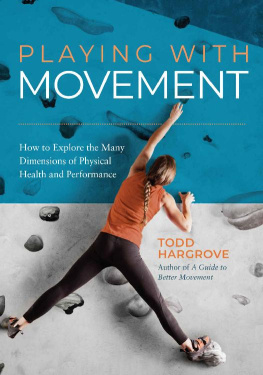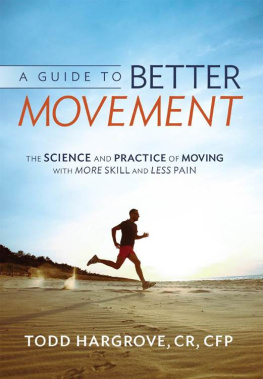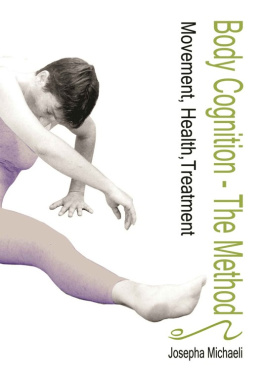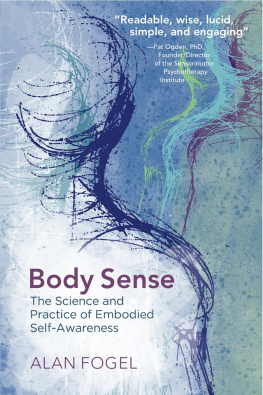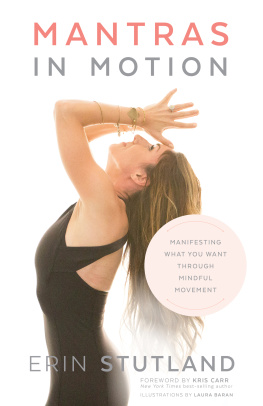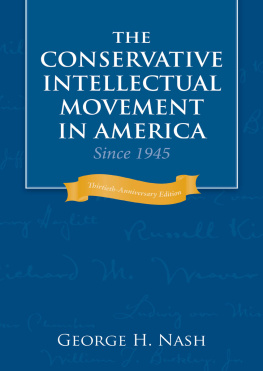The Sense of Movement
An Intellectual History
ROGER SMITH
Process Press / London / 2019
Published by Process Press Ltd.
Copyright Roger Smith 2019
Roger Smith has asserted his right to be identified as author of this Work in accordance with the Copyright, Designs and Patents
Act 1988
All Rights Reserved
First published by Process Press 2019
www.processpressltd.com
A CIP catalogue record for this book is available from the
British Library
Paperback ISBN 9781899209248
Ebook ISBN 9781899209231
For Irina

Contents

Preface
The senses of touch, and indeed the embodied worlds of mental life as a whole, are of huge contemporary interest. I contribute with a study of the sense people have of themselves moving. The sense has a history, and this book is about the ideas and conceptions of Western authors who have made that history. Their ideas have been, and still are, central to large questions in human self-understanding. In consequence, the sense of movement emerges as a surprisingly broad topic, a topic drawing together many strands of modern intellectual life. The history runs from the philosophical framework of the new science of the seventeenth century into present debates about mind, brain, agency, performance and the nature of being a person. I attend closely to relations between the sense of movement and the sense of action, the sense of being alive, in contact with a world. These relations are intimately bound up with notions we have of people as participants in the world, rather than of people as objective observers of the world. There are deep reasons why people wish to move and to dance.
The Introduction () sets out the approach, scope and themes. Here I make grateful acknowledgements.
It is appropriate to publish with Process Press. Some of the thoughts that guide the book go back to the time when I was a student at Cambridge University. Working with an inspiring supervisor, Robert M. Young, in 1970, in a department committed to the history and philosophy of science, I completed a dissertation on the relations of psychology and physiology in Victorian Britain. This remained unpublished in those indulgent but thoughtful years. Over subsequent decades, I worked in a number of different fields, though in all of them I asked questions about the way people represent being human in scientific terms. For some time now, a number of scholars, including myself, have addressed these issues under the heading of the history of the human sciences. Bob Young initially focused my interest on thought about mind and brain and provided me with a framework with which to ask historical questions with philosophical and contemporary relevance. Much later, he founded Process Press. This book offers a history of thought about the action of people in terms of relational processes. Thus, I both reassert the value intellectual, personal, social, political of this direction of thought and seek to do justice to the inspiration I have received over many years.
Publishing with Process Press, I am also able to publish the book I want to publish, to do so with editorial support and to make a substantial but accessible study available at reasonable cost. I thank Em Farrell for her generous and efficient part in this and Bob Young for the invitation. I thank my editor, Sylver Foley, for care and persistence with a complex text.
I will not attempt to acknowledge all the people who have, over decades, influenced my work. Nevertheless, I want to make clear that the work is communal. I wrote the book in Moscow, Russia, independently of institutional affiliation, but dependent on the admirable British Library. I am grateful for emeritus status at Lancaster University, UK, and for honorary membership of the Institute of Philosophy of the Russian Academy of Sciences in Moscow. My education very much continued in the History Department at Lancaster University, where I was privileged to work with John Brooke, Robert Fox, Jan Golinski, Peter Harman and Stephen Pumfrey, my colleagues in history of science, as well as with colleagues in history more widely. My immediate debts are, most of all, to published work, as the notes and references show. A number of invitations also encouraged me to think I have something to contribute. Vincent Barras (Institute universitaire dhistoire de la mdecine et de la sant publique, Lausanne) gave me space to survey sources for a history of the muscular sense, and with Guillemette Bolens (Universit de Genve), in 2010, he organized a memorable seminar, Lintelligence kinesthsique et le savoir sensorimoteur: entre arts et sciences, under the auspices of World Knowledge Dialogue, in Villars, in the mountains, in which we performed as well as talked about movement; Carolyn Burdett and Heather Tilley (Birkbeck, University of London) created the opportunity to engage with literature and Victorian psychology, at a conference on The Victorian Tactile Imagination (2013) and a symposium on Victorian Psychology Now (2016); Section 26 (Society for the History of Psychology) of the American Psychological Association invited me to give the Mary Whiton Calkins Lecture in Washington, DC (August 2014), and Deborah Johnson, University of Southern Maine, organized this, with its surprise conclusion, shared with the dancer, Meg Brooker (Middle Tennessee State University, and Duncan Dance South); Hroar Klempe (Norwegian University of Science and Technology, Trondheim) drew me into thinking more systematically about agency; members of The History and Philosophy of Psychology section of the British Psychological Society, including Geoff Bunn, Alan Collins, Jim Good, Graham Richards and Elizabeth Valentine, fostered my early discussion of the sense of movement; Sonu Shamdasani (University College London) has both welcomed my informal talks on the history of psychology and encouragingly taken standards of scholarship for granted; Irina Sirotkina is my partner in connecting with the world of dance and Russian musical movement, as well as the history of psychology, and, when there is opportunity, in walking in the mountains. I thank audiences in Cambridge (UK), Barcelona (at a joint meeting of the European Society for the History of the Human Sciences and Cheiron: The International Society for the History of Behavioral and Social Sciences), Princeton and Moscow. I express special thanks to Daniel Todes, who, with wonderful breadth of interest as well as precision of scholarship, welcomed my project and pushed me to think through what I was trying to say and how to say it. All these people, together with Bob Young, have maintained that ideas, historically understood in their context, matter as part of the good life.
A note on referencing. As anyone who writes on any topic quickly realizes, in whichever direction one turns there is a mountain of literature. The sense of movement is a very broad topic, and I therefore reference widely (though of course selectively). This serves two purposes. First, citing primary sources, I show that claims about the sense of movement have been present in a great range of intellectual and imaginative endeavours. The sources demonstrate the untenability of writing a narrow, tunnel history a history of one line of development from past to present as if a particular modern discipline were natural or inevitable. Second, citing secondary sources, I affirm an ideal of the communal identity of scholarship. I seek a just assessment of work achieved on many fronts, perhaps more than some narrowly-focused specialists recognize. With all this said, the notes and references are a resource; the text is readable without them.
Next page
